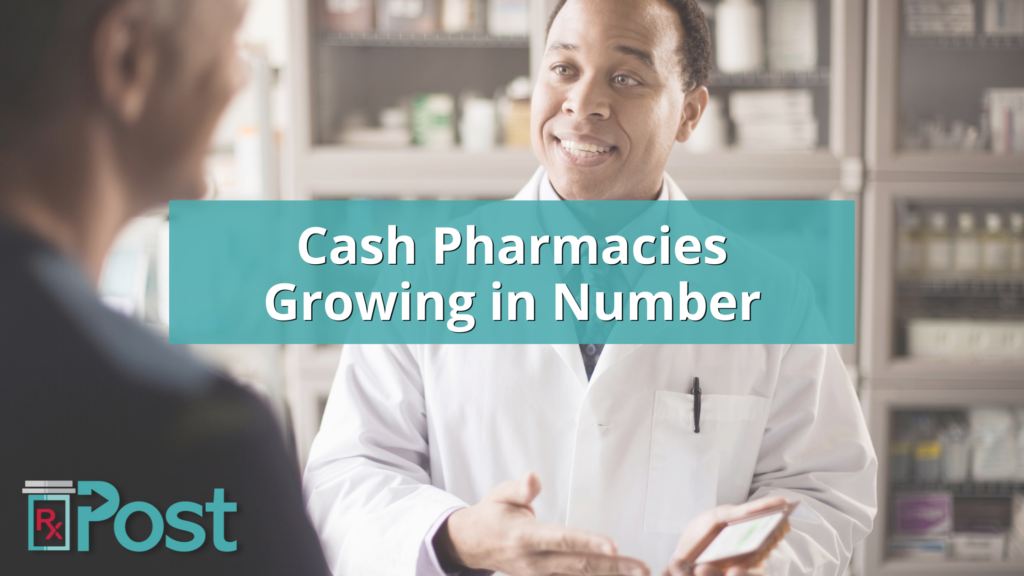Some independent pharmacies are converting to cash pharmacies, and finding they can make higher profits, while providing better quality service, operating with fewer staff, and providing patients with significant savings.
In a recent article by NBC News, independent pharmacy owner Nate Hux, who operates Pickerington Pharmacy, opened a cash pharmacy right next door called Freedom Pharmacy. As owner of a traditional pharmacy model that accepts insurance and a cash pharmacy, Hux is able to compare the costs of medications for patients to make the best recommendation. For some brand-specific prescriptions, Pickerington offers a better price via insurance but in most cases where there is a generic available, Hux’s Freedom Pharmacy provides the lowest out of pocket cost to the patient.
According to NBC, Freedom Pharmacy is one of a small but growing number of “cash” or “self-pay” pharmacies, sometimes able to save customers hundreds of dollars on a single medication. As patients struggle with rising prescription drug prices and insurance deductibles, everyone from members of Congress to entrepreneurs like Mark Cuban and small-business owners like Hux are trying to lower drug costs. By opting out of the insurance system altogether, Hux and other cash pharmacy owners are able to avoid many of the fees and rules that inflate medication prices. Consumers say they are reaping the benefits.
While 91% of prescriptions in the U.S. are filled through insurance, according to the health care data analytics and consulting firm Avalere Health, pharmacists like Hux are betting that the savings and service they can offer outside that system will draw enough customers to make their experiments a success.
How Do Cash Pharmacies Work?
Cash pharmacies typically sell generic drugs at the price they pay for them, plus a small markup or membership fee. Those are classic retail business models, but they’re rarely seen in health care.
“What’s old is new. Decades ago, patients were the customer at the pharmacy,” said Antonio Ciaccia, president of 3 Axis Advisors, a research consulting company that studies drug pricing, and whose clients include Mark Cuban’s CostPlus Pharmacy. “Today, the customer at the pharmacy is the insurance company.”
“Right now, we have a system that is completely predicated upon artificially inflated drug prices,” he said. “What cash pharmacies offer is the opposite — the antithesis. It’s a return to retail fundamentals.”
In the past few years, cash pharmacies have popped up around the country, from Pittsburgh to Burns, Oregon. Cuban’s online CostPlus Pharmacy, which does not take insurance, is one of several such startups to enter the market recently.
Larger companies like Walmart have offered their own generic prescription drug programs as cost-saving insurance alternatives for years. Prescription discount card providers like GoodRx are another model intended to help consumers navigate the drug pricing system and save money.
But cash pharmacies still make up a tiny portion of the market, and most Americans are unlikely to have one in their community. Approximately 5% of retail prescriptions are filled using discount card programs like GoodRx, according to Avalere.
Benefits of Cash Pharmacies
“Generic Viagra and generic Cialis, those types of things, are way more expensive inside the system than just doing self-pay pharmacy,” Hux said. He rarely sees them well-covered by insurance. “Those would be $1,000 for a 30-day supply, maybe. And here, they’re about $15 for a 30-day supply.”
Working with insurance is expensive, said Hux. The various fees, rules and processing time that come with accepting insurance affect how pharmacies like Pickerington operate, and push up labor costs. It takes more staff as well. Hux typically has one to two people working at Freedom daily and three to four at Pickerington.
“We have to pass all those costs on to the consumer,” he said. By cutting out the middlemen, Freedom Pharmacy is far cheaper to operate. “It’s just between the consumer, me and the doctor. It makes us much more efficient, it gives better outcomes, and it’s less expensive.”
Another benefit is the ability to fill a prescription whenever it is needed, rather than once every 30 days, which provides more flexibility to patients, and to doctors who want to prescribe a medication differently.
To Hux, putting the decisions for patient health back in the hands of the doctor and patient is the greatest benefit he offers patients. At Freedom, “sometimes it’s less cost, sometimes maybe a little bit more. But at least they have a choice. They know exactly what the price is upfront,” he said. “When consumers have choices, it’s good for everyone.”


